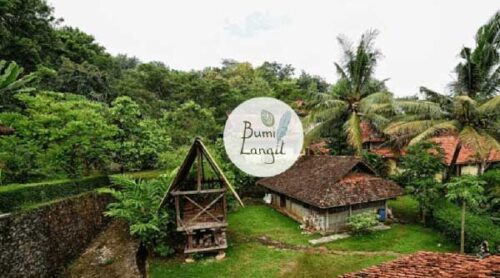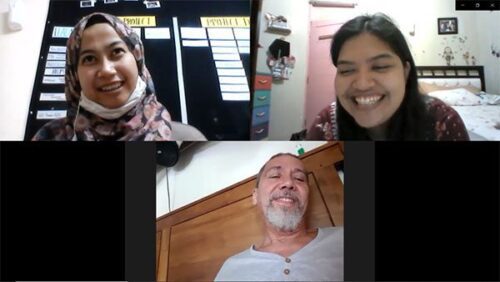Lessons from Bumi Langit: Learn to Break Free from Waste Starting from Our Mindset
Have you ever heard about Bumi Langit before? No, not the one that creates comics and characters on Indonesian local superheroes, but Bumi Langit as a living space where we can learn about the importance of mutual living between man and nature.

Waste4Change first learns about Bumi Langit upon watching the movie Semes7a, wherein Bumi Langit becomes one out of seven figures who, in their own way, came up with local solutions in addressing the environmental crisis that humanity is currently facing.
Welcoming the month of August and Indonesia’s Independence Day, Waste4Change came up with an idea to interview and hold a discussion with Bumi Langit via conference call regarding the waste issue, specifically on the theme #BreakFreefromWaste. Turns out that we’re lucky enough to be hosted by the very founder of Bumi Langit, Mr. Iskandar Waworuntu, or usually called Pak Is.



Check out some of the important takeouts and summary based on our discussion with Pak Is through Zoom
#1: Waste is a byproduct of life that has no precedent in nature.
Upon asking the first question, pak Is started the discussion by talking about the nature of waste, a fundamental notion that is important to be reflected upon.
He said that in Islam, God does not create vanity. Every single thing is created to fill a certain purpose, to generate usefulness. Consequently, if we are God’s creation, then like it or not we have to be useful and to utilize the things that has been provided for us.



“In this context, humans have a special position, in a way that we have something called a free will compared to other creatures. Humans can stray away from their nature and determine their own destiny. Then problems started to arise when humans possess the will and tendency to destroy and exploit, more than what they need.”
The next sentence that Pak Is says astonished me,
Taking something excessively is forbidden because at the very core of it, it can be considered as theft. In this context, the object is nature.
“Our duty as mankind is to make ourselves cultivate kindness. Because the very embodiment of vanity is none other than waste”
Pak Is also asked us to reflect on our ancestors, on how they do not generate waste at all. There was not any residual throughout their life. Hence, due to the absence of such waste, their responsibility becomes lighter in the afterlife.
Yes, we will be held accountable for everything that we produce that end up as waste. And so as a modern human being who lives in big cities, we sure have a lot to be held accountable for.
#2: We have to say NO to a system that produces vanity, we need to say NO to a system that is exploitative
In principle, waste is created due to the flaw in the system. There is something wrong with the system that we are using now, which is where the waste comes from.
The way we live now is based on taking and exploiting instead of giving, and it’s clear that it will not be sustainable. According to pak Is, an example of taking things that is not our right and becomes the root of our everyday problem is our dependency on fossil fuels.



This is what makes human lives unsustainable. Sustainability will only start to happen if we choose to cultivate kindness, not exploit.
Pak Is also adds that humans often see waste only when it’s tangible. This is dangerous because waste can be present even in the tiniest form possible, like microplastic. Furthermore, such waste can further become a burden for the earth as well as nature, an expensive price for our livelihood. This is what a broken system looks like, the one that we made.
It is important to remember that we cannot build kindness based on a foundation that is broken. Our way of life is corrupted, even when we take into consideration the creative solutions that many people and organizations came up with in order to tackle the waste crisis.
Therefore, pak Is believes that the very basic thing that we need to do is to realize that we’ve been doing this the wrong way and that we need to get out from this broken system and start building an even better one, one that does not cost the earth and our environment.
#3 The term “recycle” is more like a “downcycle”, a downgrade process that does not happen naturally.
When talking about recycling, people might argue that the recycling results can be used for one or two times longer, but ultimately, it will still end up as waste.
Furthermore, pak Is also talks about the issue regarding waste officers and waste pickers, “We cannot let waste pickers and waste operators to handle our waste all day and night. The thought that they also bring their children with them, or that they slept while still being surrounded by waste is terrifying.
This is a system that is not pro life. We are burdened by such terrible mechanisms. It is true that waste operators might have a lucrative job by handling our waste, but then again that is if we only measure it from an economic point of view.
Even if someone still argues that our residuals still have an economic value, I would rather argue that it’s a forced concept, a reinforced perspective that seeks justification in terms of its economic benefit.
#BreakFreefromWaste, the Bumi Langit style
Bumi Langit’s vision is to become the center of community learning in order to understand and implement natural Sunatullah living through permaculture farming and food forest.



Furthermore, Bumi Langit also holds Adab as its guiding principles. Adab itself is both a prayer and exercise through daily activities and behaviors. Here are some of the points from the Adab framework:
- Mutual respect and brother/sisterhoods with all creatures, be it animals, plants, water, soil, sun, and moon, etc.
- Spiritual exercise as personal or in the community to approach the essence of reality as we believe we are spiritual beings in body and soul
- Praying
- Theocentric life
In addition, Bumi Langit as a living space also try to be independent in terms of energy. They consciously do not use PLN (State’s Electricity Company) as its source of electricity. Rather, they are using a hybrid system combining solar panels and diesel power.



For cooking, Bumi Langit utilizes biogas that was processed from both human and animal waste, which is processed in a 9-cubic-meter digester. A similar concept is also used to manage the water cycle.
From all the things that were implemented at Bumi Langit, it’s as if we gradually understand what Pak Is mean, that by living close to nature and utilizing natural resources sufficiently, there will no such thing as vanity (waste) that might result from such process.
Read the article in Indonesian version in here.



